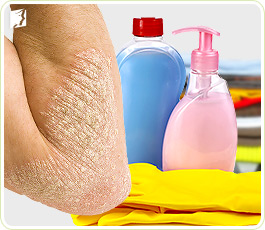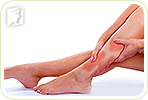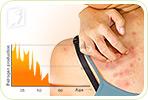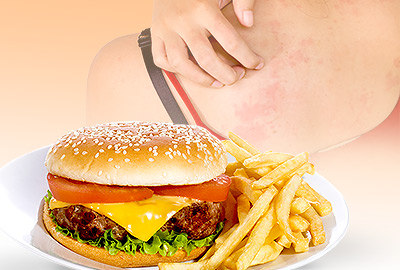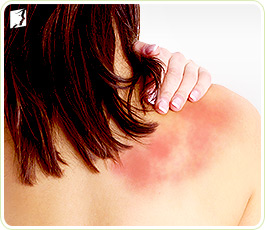
Although itchy skin is one of the lesser-known symptoms of menopause, it is one that affects many women and can cause significant irritation and pain. While itchy skin can affect just about anyone - including women who are not approaching menopause - it is especially common for menopausal women. Often, the underlying issue is hormonal, but other factors may influence skin health as well.
To best treat and manage itchy skin, it is important to understand what has triggered the problem. Learn about the many possible causes of itchy skin.
Hormonal Causes of Itchy Skin
Scientists have discovered that changes in estrogen during menopause can have a significant impact on skin health. For women entering menopause, this is the most common cause of itchy skin.
Estrogen plays an important role in many functions in the body, including in the production of collagen. Collagen is a protein produced by the body that is used in building healthy skin. Research shows that it is crucial in keeping skin thick and moisturized and preventing wrinkling and scarring.
During menopause, estrogen generally begins to decrease. Because estrogen production is linked to collagen production, collagen tends to decrease as well, causing problems with skin thickness, dryness, and wrinkling. This makes it more likely for skin to become itchy and cause discomfort.
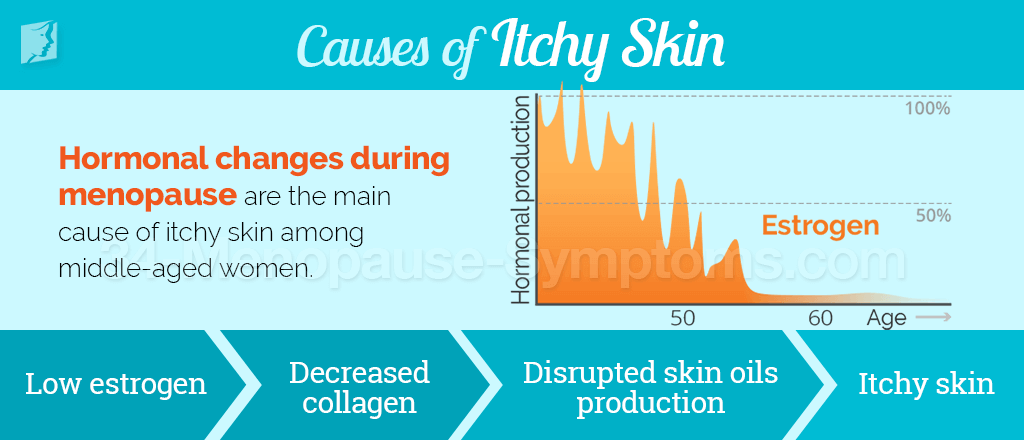
Other Causes of Itchy Skin
Estrogen deficiency is the most common cause of itchy skin during menopause, but there may be other factors that play as well. A number of causes are related to other illnesses or simply to normal environmental factors.
Dry skin. Low estrogen levels can cause dry skin, but skin may also simply become dry because of the climate or because of dehydration in the body. Dry skin may also be caused by washing or bathing too much or for long periods of time.
Bug bites. While mosquito bites are often recognizable as insect bites, some bugs - such as bedbugs - can bite people in a way that appears more like a rash than individual bites.
-

Skin conditions. Eczema, psoriasis, and other skin conditions may cause rashes and sections of irritated skin that may require medicated creams to clear up.
Nerve disorders. Because the skin is full of nerve endings, any problem with the nerves in several parts of the body may present as a skin problem, whether it is a noticeable rash or simply itchy skin. These conditions can range from multiple sclerosis (MS) to a pinched nerve.
Allergic reactions. Skin can develop a rash because of an allergen, or even just a strong irritant. For instance, poison ivy tends to cause skin irritation, but many people may also react to more innocuous things, such as certain metals in jewelry or specific types of laundry detergent.
Internal diseases. Occasionally, a rash or other skin irritation may be a symptom of an underlying illness that affects other parts of the body as well. Liver and kidney problems are two common illnesses that may result in skin irritation.
When to See a Doctor
While itchy skin is always unpleasant, there are some cases when it becomes clear that a doctor's intervention is needed. Contact a medical professional for advice if any of the following situations occur.
- Itching distracts you from work or other responsibilities or interrupts your sleep.
- Itching is severe and constant for more than two weeks.
- Itching is associated with other, unexplained symptoms.
- There is no obvious explanation for severe itching.
- Itchy skin does not respond to home remedies.
- The entire body is affected by itching.
For less severe cases of itchy skin, women can manage the symptoms on their own. Read on to learn more about treatments for itchy skin.
Sources
- Nair, Pragya A. (2014). Dermatosis associated with menopause. Journal of Midlife Health. 5(4). Retrieved May 8, 2017 from https://www.ncbi.nlm.nih.gov/pmc/articles/PMC4264279/
- Shah MG et al. (2001). Estrogen and skin. An overview. American Journal of Clinical Dermatology. 2(3). Retrieved May 8, 2017 from https://www.ncbi.nlm.nih.gov/pubmed/11705091
- Itchy skin (pruritus) Symptoms and causes. (2016). Mayo Clinic. Retrieved May 8, 2017 from http://www.mayoclinic.org/diseases-conditions/itchy-skin/symptoms-causes/dxc-20262871

